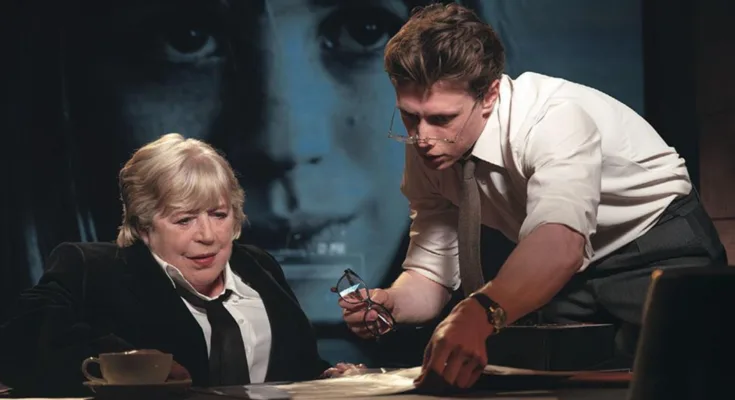
directing duo Iain Forsyth and Jane Pollard made waves with 20,000 Days On Earth, their unconventional 2014 documentary about Nick Cave that followed a fictional day in the beloved musician’s life. Their latest film takes a similarly inventive approach to celebrate the life of Marianne Faithfull.
The set-up is a little goofy. A sharp-suited Tilda Swinton takes on the role of Overseer Of The Ministry Of Not Forgetting – and makes Faithfull the subject of her first research project. Her timeless 1964 single ‘As Tears Go By’ put her at the forefront of British music making it big in America alongside The Beatles, Bee Gees and The Rolling Stones, so she’s a well-deserving pick. From there, Swinton employs an array of fake civil servants – chiefly George MacKay (1917) as Record Keeper – to catalogue Faithfull’s influential career and sort the fact from fiction.
The Ministry Of Not Forgetting is little more than an elaborate framing device for an otherwise fairly straightforward rock doc but it does allow MacKay to interview Faithfull on camera, presenting her with archive material and capturing the memories that come alongside this trip down memory lane. These moments are cut with a wealth of archive footage while artists such as Courtney Love and Beth Orton deliver passionate covers of Faithfull classics.
Faithfull herself is extremely game for the whole thing even though she’s frequently filmed wearing an oxygen tube, the result of a recent battle with emphysema and COVID-19. At any rate, her interactions with MacKay’s Record Keeper are charming and remarkably candid, as she talks openly about her experiences with drug addiction, homelessness and pregnancy.
Some of Faithfull’s story is well-trodden territory, such as her discovery at a party by Rolling Stones manager Andrew Loog Oldham at the age of 18, and her subsequent relationship with Mick Jagger or her first chart success with ‘As Tears Go By’. However, there are more personal revelations here too, most notably when she talks about meeting Bob Dylan. Her reaction when MacKay shows her footage of the encounter from D.A. Pennebaker’s Don’t Look Back is delightful.
Similarly, the archive footage is extremely worthwhile and smartly edited. A montage of historical interviews where Faithfull is repeatedly interrogated about her personal life by a succession of male talk show hosts is interrupted by Zawe Ashton (as one of the Ministry’s employees) who offers suitably outraged commentary.
The film’s most superfluous element is a roundtable of celebrity panelists (Edith Bowman, Sienna Guillory and others) discussing Faithfull’s feminist influence. Still, at least that allows the film to get all the usual talking heads out of the way in one go.
The undisputed highlight of the film are Faithfull’s various musical performances from across her career. Illustrating her many eras, we see her ace folk, rock, jazz, new wave and spoken word. The best is saved for last though, as Nick Cave and Warren Ellis show up at the Ministry to aid a fiery Faithfull performance of ‘Misunderstanding’ from her 2018 album ‘Negative Capability’. Her signature smokey voice is as affecting as ever.
Sadly, that would prove to be Marianne Faithfull’s last recorded performance. She died in January of this year at the age of 78 before the film could be completed. It’s a sombre note that ends an otherwise triumphant celebration of an all-time great.
Details
- Directors: Iain Forsyth, Jane Pollard
- Release date: TBA (NME watched Broken English at the Venice Film Festival 2025)
The post ‘Broken English’: a beautiful celebration of defiant ‘60s icon Marianne Faithfull appeared first on NME.



